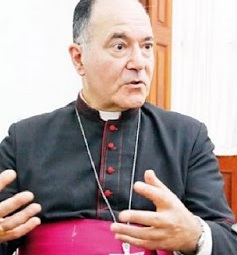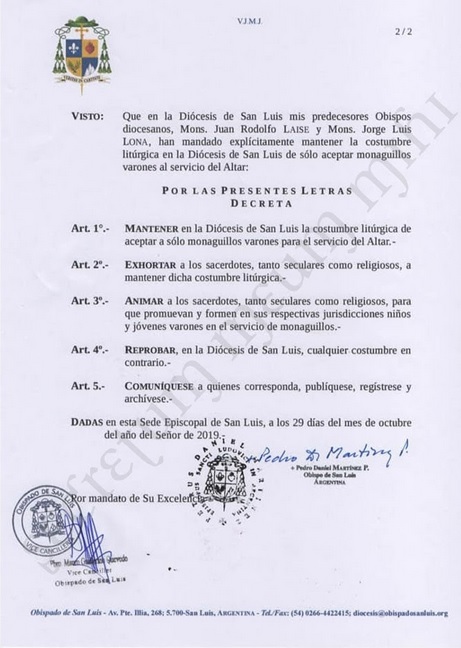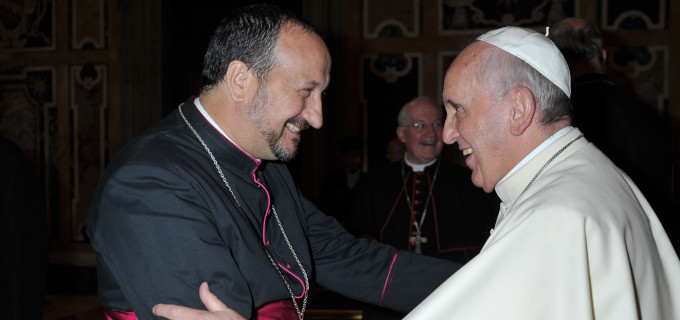(Rome / Buenos Aires) On June 9, Pope Francis accepted the resignation of Monsignor Pedro Daniel Martínez Perea as Bishop of San Luis in Argentina. The Vatican propaganda speaks of “resignation”. Since Bishop Martínez Perea is only 64 years old, it is more accurate to say that he was resigned by Francis.
Msgr. Martínez Perea, born in the city of Mendoza in 1956, was ordained a priest in 1981 for his home diocese. In 1986 he moved to the neighboring diocese of San Rafael, where he was incardinated. San Rafael was created in 1961 by dividing the diocese of Mendoza. Since 1973, the Bishop of San Rafael was the Ukrainian-born Monsignor Leon Kruk, who founded the diocesan seminary and saw national identity and the Christian faith as an inseparable unit. In the troubled years of the transition from military dictatorship to democracy, Bishop Kruk was a contact point for priests who were faithful to the Church and who opposed the subversive activities of the followers of Marxist theology of liberation. Bishop Kruk was killed in a traffic accident in 1991.
The special case of San Luis
In 2009 Pope Benedict XVI appointed Don Pedro Martínez Perea as Bishop Co-Adjutor with succession rights for Bishop Jorge Luis Lona of San Luis. The predecessor of Bishop Lona was the Capuchin Juan Rodolfo Laise (1971-2001), who died very old in July 2019 in San Giovanni Rotondo in southern Italy. The special concern of Bishop Laise, a canon lawyer, was to promote the awe-inspiring understanding of the Holy Eucharist, which is why he did not follow certain post-conciliar paradigm shifts. When he gave Communion, he openly opposed this. Throughout his life as a bishop, as well as in his pastoral and journalistic work, he advocated Communion kneeling on the tongue. At his own request, he spent the evening of his life as a confessor at the site of the long-standing work of his holy confrere, Padre Pio von Pietrelcina. The bishop, who only celebrated in the traditional rite, could only do so in private in San Giovanni Rotondo, since the religious superiors prohibited him from celebrating publicly. Until shortly before his death, he spoke up in defense of the Immemorial Rite and against efforts toward intercommunion .

When Pope Benedict XVI in 2009 was looking for a successor who would continue the legacy of Bishop Laise and the ailing Bishop Lona in the diocese of San Luis, he found him in Don Martínez Perea. When Bishop Lona retired in 2011 at the age of 75, Martínez Perea succeeded him.
The 2019 decree
On October 29, 2019, the bishop issued a decree that observers in Argentina and Rome are convinced that it would trigger for the retirement that has now taken place.
With the decree, Bishop Martínez Perea prohibited the use of female altar servers. He stated:
"(...) in the diocese of San Luis the liturgical custom of only accepting male altar servers for ministry will continue."
At the same time, the bishop determined that any contrary practice had to be stopped and given up again where it had already started.

The bishop referred to his liturgy-based jurisdiction and the corresponding interpretation by the Pontifical Commission for the interpretation of legal texts, to the relevant circulars and instructions of the Roman Congregation of Worship from 1994 and 2004 and to the decisions of his predecessors Laise and Lona, who had "explicitly" asked for male servers only. In 1994 the Roman congregation of worship gave local bishops the opportunity to use female altar servers if necessary. There is no general approval, but an emergency regulation. In the post-Council era, however, such special regulations were made the "rule" in some countries because the drive is not a "plight" but a different theology.
In connection with his decree, Bishop Martínez Perea expressly stated that there was no need for this exception in his diocese.
The situation in the diocese of San Luis in autumn 2019 was as follows:
- Only the traditional form of receiving communion, oral communion, is permitted in the diocese.
- Only male altar servers are permitted to perform the altar service.
- In contrast to the recommendations of the Argentine Bishops' Conference on the controversial post-synodal letter Amoris laetitia from 2017, remarried divorced women are not admitted to the Sacraments.
- Conservative and traditional communities and orders were also welcomed into the diocese and could develop their apostolate undisturbed.
There are few dioceses of this kind worldwide. And that seems to have disturbed some in the Argentine Bishops' Conference and in the Vatican.
The backlash
The backlash was not long in coming. 37 days after the decree, on December 5, 2019, Bishop Martínez Perea had to inform the priests, religious and believers of his diocese that Pope Francis had ordered " an apostolic visitation of the diocese of San Luis."
Francis appointed Msgr. Milton Luis Troccolli Cebedio as Apostolic Visitator, whom he had appointed Bishop of Maldonado-Punta del Este in Uruguay five months earlier. He visited the Argentine diocese from 10th to 13th December.
Katholisches.info wrote on December 9, 2019:
“Bishop Martínez's letter gives no reasons for the visitation. Such were not communicated to him. A similar procedure under Pope Francis in some other dioceses meant that the Commissioner followed the Visitor. The chronological sequence of events leaves little scope for other interpretations. Although Bishop Martínez only affirmed what the Church teaches, the visitor was sent to him a few days later. It was a clear signal that his actions are obviously not wanted by Rome.”
Bishop Martínez Perea was retired by Pope Francis three days ago. According to the official Vatican announcement, the Pope had only complied with the bishop's wish to be released from office. But it is just a phrase, as Msgr. Martínez himself said. In a statement on Facebook, he wrote that a bishop signs a blank check with his appointment, in which the head of the Church can enter the date of how long the appointment is valid. In a very reserved manner he said that Francis had withdrawn his mandate.
Francis will be succeeded by the Bergoglian Msgr. Gabriel Bernardo Barba, who is close to the papal confidante and ghostwriter Victor Manuel Fernández, Archbishop of La Plata. Msgr. Fernández is the archbishop who, a few months after taking office, eliminated the Motu proprio Summorum Pontificum in his Archdiocese. Bishop Barba, ordained priest for his home diocese in Morón in 1989, was vice-director of Caritas there and was responsible for the formation of permanent deacons. In December 2013 Pope Francis appointed him Bishop of Gregorio de Laferrére and now Bishop of San Luis. At the Feast of Corpus Christi 2017, Msgr. Barba made a plea against Communion on the tongue and for hand Communion in his sermon. He said:
"The gesture of hand Communion seems to me to be a much more meaningful and mature gesture than Communion on the tongue."
Bishop Martínez nevertheless gave his successor advice in his statement on Facebook: to respect the traditions of the diocese of San Luis. He dressed his request in the language of the Church hierarchy, which is why it was certainly understood by Monsignor Barba. Whether he will heed this is another question. Bishop Martínez Perea wrote verbatim: "He will respect the traditions, although he is shaped differently than I am".
The purge of the Argentine episcopate, where there are fewer non-Bergoglians left, continues. You can see how many of the bishops who ordained Mgr Martinez Perea are still in office. And the purge does not only affect Argentina.

Text: Giuseppe Nardi
Image: Wikicommons / Diocesis San Luis / Vatican.va (screenshot)
Image: Wikicommons / Diocesis San Luis / Vatican.va (screenshot)
Trans: Tancred vekron99@hotmail.com
AMDG








